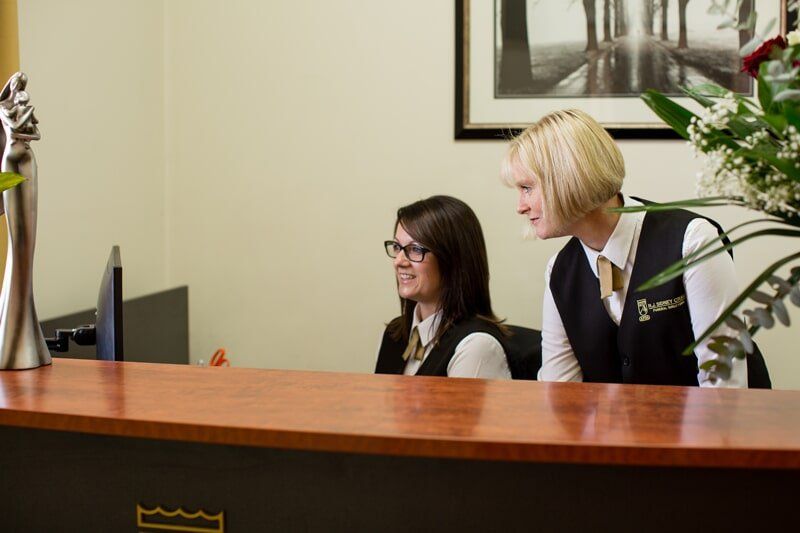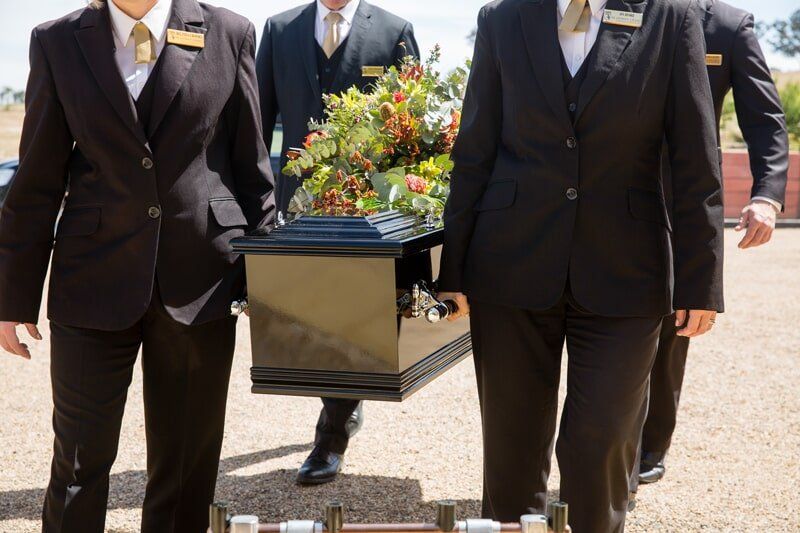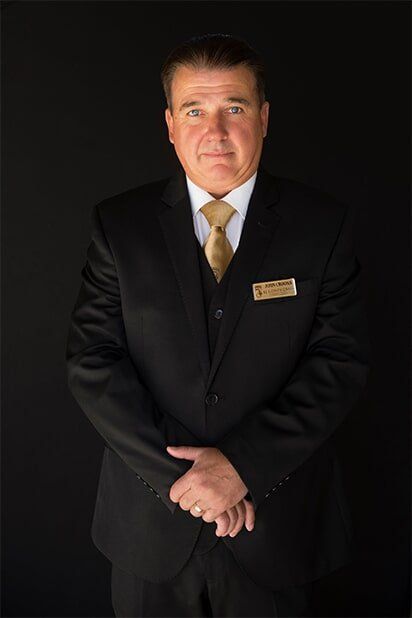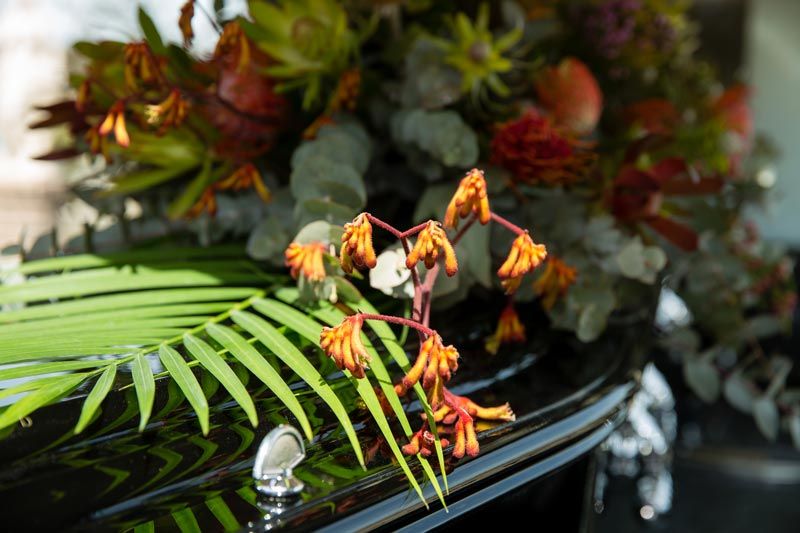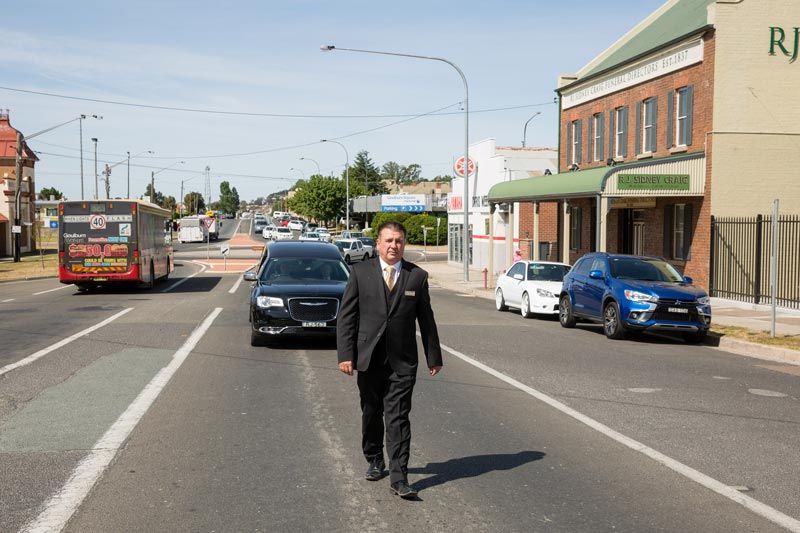WHAT TO DO NEXT
RJ Sidney Craig Funeral Directors has compiled some helpful information and resources that may assist you in the event of a family member’s death, especially if the death is sudden.
The first few days of losing a loved one can be especially draining and tiring. For many people, it helps to have a streamlined series of steps that they will need to take to make sure that everything goes smoothly - from the funeral service through until when their loved one is laid to rest.
Our helpful guide contains everything you will need to do.
This includes the first steps you need to take the moment someone dies, how to arrange a funeral service, funeral costs and what you need to do on the day of burial or cremation.
Our caring staff will gladly assist you to make sure that you won’t have to worry much about the finer details of arranging a funeral, allowing you to spend more time with your loved ones and say your final goodbyes to your beloved.
For further information regarding our burial and cremation services, please do not hesitate to contact our caring staff on 02 4821 2122 or visit our premises located at 298 Sloane Street, Goulburn, NSW.
WHAT TO DO WHEN SOMEONE DIES
At this time, you may be experiencing a raft of emotions, have had little sleep, and be overwhelmed and confused as to what needs to be done next. Following is a guide as to what you need to do when someone passes away.
WHEN SOMEONE DIES IN A HOSPITAL OR NURSING HOME
Most people in Australia die either in a hospital or nursing home. When this happens, the director of nursing, nurse in charge or nursing home representative will help you with the formalities and will make arrangements for the doctor to issue the death certificate.
If your loved one wished to be cremated, you need to notify the hospital or nursing home representative immediately, as additional certificates will need to be prepared by the doctor. Early advice of this decision will save possible and unnecessary delays. Also, please contact us as soon as possible so we can begin liaising with the nursing home or hospital to make the necessary arrangements.
We are available 24 hours a day, 7 days a week.
WHEN SOMEONE DIES SUDDENLY
If the death is sudden or accidental, or the cause of death cannot be confirmed, it is the doctor’s responsibility to notify the police. In these cases, it is important that the deceased is not moved or disturbed in any way without the authorisation of the coroner.
The police will contact a government appointed funeral home to transfer the deceased from the place of death to the coroner’s mortuary. The coroner will then investigate and determine the cause of death, which may involve a post-mortem examination. This procedure may slightly delay the funeral arrangements until the necessary clearance is obtained.
In these circumstances, it is still your right and responsibility to contact the funeral director of your choice so that they can attend to the funeral arrangements in line with your wishes.
WHEN SOMEONE DIES AT HOME
If a relative or friend dies at home, the first person to contact is the doctor of the deceased. If the doctor has treated the deceased in the past three months and the doctor can confirm the cause of death, a death certificate will be issued.
The next step is to contact us. We can arrange for the deceased to be transferred to our funeral home and attend to the funeral arrangements on your behalf.
WHEN SOMEONE DIES INTERSTATE OR OVERSEAS
In the event of a loved one passing away whilst overseas, it is important to notify us as soon as possible so that we can make arrangements to repatriate the deceased home and attend to any statutory or customs requirements.
On the other hand, if someone is visiting Australia from overseas, or resides here but was born in another country, the family may wish to send the deceased back to their homeland for burial. Again, you should contact us immediately, as there can be an extensive process of liaison with the Consulate General of the deceased’s homeland and relevant Australian government departments. We can prepare and process the necessary documentation on your behalf.
WHEN SHOULD YOU CALL US?
Regardless of the circumstances at the time of death, it’s important that you contact us at your earliest convenience. Our highly trained staff can organise funerals locally, interstate and overseas and are available 24 hours to arrange for your loved one to be placed in our care.
We also have female funeral directors available if you would like the arrangements to be conducted by them. Once the cause of death has been confirmed we can begin making the funeral arrangements.
Our commitment to providing the highest standard of service ensures the arrangements are made with professionalism, empathy and respect for your wishes and those of your loved one.
ARRANGING A FUNERAL
Losing a loved one is a very emotional time. At RJ Sidney Craig Funeral Directors, we understand how important it is to make sure that funeral services for your loved one is personalised and celebrates the life they lived.
What Do I Need To Do?
Following the loss of a loved one, there are many decisions which need to be made.
We’ve put together this easy-to-follow checklist for you to discuss with your family when you’re organising the funeral arrangements of your loved one.
At RJ Sidney Craig Funeral Directors, our highly trained staff can take the worry out of organising funerals for you. We will discuss all details of arranging a funeral with you.
We take care of every detail and ask for your input to ensure the funeral reflects both your own and the wishes of your loved one.
Please feel free to discuss your ideas with us so that the funeral is a meaningful experience for you and your family.
When Someone Has Passed Away
After the death certificate has been issued, consult your loved one’s Will to ensure that their wishes are followed with respect to burial or cremation and other matters. If your loved one has made arrangements and previously advised our staff of their wish to donate their organs, we can assist in contacting the relevant authorities
When: As soon as possible following death.
Inform relatives and close friends of your loved one’s passing. Also inform their solicitor or public trustee, employer and family doctor.
When: As soon as possible following death.
Contact RJ Sidney Craig Funeral Directors so we can begin making the funeral arrangements.
When: As soon as possible following death.
CHECKLIST ON HOW TO ARRANGE A FUNERAL
FUNERAL SERVICE CHECKLIST
- Clergy or celebrant to preside over the ceremony
We can liaise with clergy or a celebrant regarding the type of service you prefer, and the date, time and place. Or you may wish for one of our staff members to act as a civil celebrant and conduct the ceremony.
- Decorations
You may wish to consider adding some decorations within the church or chapel to celebrate your loved one’s life. These may include photographs, medals, sporting or hobby memorabilia, flags, any special interest items and candles.
- Select a date for the burial or cremation
Most funerals take place a few days following death. We will organise a time and place for either a burial or cremation and will contact the necessary authorities.
- Funeral notices
Our staff will prepare and arrange for funeral notices to be inserted in any metropolitan, regional, interstate or overseas newspapers, and provide assistance with any radio requirements.
- Clothing
Choose clothing and jewellery for your loved one to wear within the coffin or casket and any other special items.
- Choose the location of the funeral service
Either at a church or chapel or at the graveside or other location by arrangement.
- Eulogies and readings
Discuss with family members and close family friends as to whom may wish to give a eulogy at the funeral service. Discuss the content of the reading with clergy or the celebrant ahead of the funeral service.
- Choosing pallbearers
Discuss with family members as to whether they would like to be a pallbearer for your loved one’s coffin. RJ Sidney Craig Funeral Directors can also provide this service for you.
- Music and musicians
Choose some music to be played at the beginning and at the end of the service and/or for musicians to play. Generally the music will reflect your loved one’s personality and musical taste.
- Flowers
We can order the floral tributes of your choice and arrange for their delivery to the church, chapel or graveside. We will ensure all floral tribute cards are collected and returned to you and your family.
- Holding a wake
Select where you will hold a wake for the deceased. This can be at a venue of your choosing such as a home, restaurant or club.
- Transport
We have a modern fleet of funeral vehicles and mourning cars which are available to transport family members to the funeral service.
- Consider donating to a charity
You can make a donation to a charitable organization and/or advise funeral service attendees in advance if donations are preferred in lieu of floral tributes.
- Memorial booklet
We can organise a memorial booklet, containing the personal signatures of all those who attended the funeral, for you and your family to keep.
- Draw up a guest list
Determine how many people will attend the cremation or burial. The number of people attending will determine the choice of venue such as a church or chapel. This will also be a guide to the numbers of Service Booklets/Bookmarks you may need to have printed.
- Pictorial Presentation
You may wish to have a slide show of your loved ones' moments and memories. These photos will be on display to your family and friends so gathering appropriate photos is important.
BURIAL OR CREMATION?
Many people express their preference for burial or cremation before they die. If such wishes are known, we can arrange the funeral service accordingly. Otherwise, it is up to you to decide. For a burial, we need to know if a new grave is needed, or if there is an existing family site.
If your family does not already own one, we can assist in selecting a burial site or crypt for your loved one. For cremation, you need to consider what to do with the ashes.
There are many choices available, such as a wall or tree niche, a burial plot, mausoleum, choosing a crematorium space, placing the ashes in a lawn cemetery or an urn and memorialisation of your loved one. Additionally, we can assist you in the selection and ordering of cast-bronze plaques and can also recommend a suitable monumental mason for the design and erection of headstones and memorials.
We are available to discuss these and other options with you when the time arises.
FUNERAL SERVICES
There are many alternatives to consider when choosing what kind of funeral service you would like. Often the choice is dependent on whether your loved one is being cremated or buried.
Below are the most frequent services we are asked to arrange. However, you are not restricted to these options, so if you have any other suggestions, please feel free to discuss them with us.
The most common funeral services include:
- A service and committal in a church or our chapel.
- A service held in a church or our chapel followed by a procession to a cemetery.
- A service and committal at a crematorium chapel.
- A service and committal at a graveside.
- A service at an alternative location, such as a park, beach, private gardens, or family home.
CHOOSING A COFFIN OR CASKET
The decision to select a coffin or casket is purely a matter of personal preference. The basic difference between the two is in design. A coffin is tapered at the head and foot and is wider at the shoulders, while a casket is rectangular. We have a wide range of different styles for you to choose from.
VIEWING
The decision for viewing before the funeral service is entirely up to you and your family. In our experience we find many people who were at first hesitant to view their loved one later say how much it helped them with their grief or aided in closure. We offer private and comfortable viewing facilities for you and your family to say a personal goodbye to your loved one.
As we make the arrangements, we can discuss a suitable time for the viewing to take place.
WHAT IS EMBALMING?
Embalming is an important custom for many cultures and families. In short, embalming involves preparing the body with special solutions enabling preservation for a long period of time. Sometimes embalming is necessary for hygiene purposes and to preserve the natural appearance of your loved one.
Also, embalming is often required when the departed is to be repatriated interstate or overseas, or if the final resting place is in an above-ground mausoleum. If embalming is requested, we have modern facilities and trained practitioners who are experienced in carrying out this procedure. As members of the Australian Institute of Embalming and the British Institute of Embalming, we are fully qualified to perform embalming on-site in our approved mortuary.
PERSONALISING THE FUNERAL
Following are some of our suggestions to help you add meaning and a personal touch to the funeral service.
- Incorporate the deceased’s favourite music into the funeral service. You may wish to consider a slide show presentation reflecting your loved one's life. RJ Sidney Craig Funeral Directors has the capacity to put this slide show presentation together – relieving families of this burden.
- Organise for the deceased’s favourite flowers to be displayed or arrange for close family members to participate in the service by placing a flower or personal item on the coffin or in the grave.
- Provide the officiating clergy or civil celebrant with details about the life of the deceased so that fond memories can be shared.
- Involve family and friends in the eulogy, religious readings and singing.
- Arrange for clubs and associations to attend so that they can show their support and pay their last respects.
- If the deceased was an ex-serviceperson, we can arrange for an RSL Service representative, the Australian Flag for Service Ensign to be placed over the coffin, and/or for a guard of honour.
- Place personal items which reflect the life of the deceased on or inside the coffin.
- Arrange for a framed photograph of the deceased to be placed on the coffin during the service.
- Arrange for the funeral to be videotaped. Relatives and friends not able to attend will be extremely appreciative.
- Hand out memorial cards as a special memento for those attending the funeral service.
- Organise for family and friends to gather and share memories after the funeral service.
- Send out thank you notes to show your appreciation to those who attended the funeral service and for their support.
- Livestream capabilities.
FUNERAL COSTS
The cost of a funeral depends on a variety of factors. When making funeral arrangements, you are asked to consider your own financial circumstances and therefore make appropriate selections.
We will discuss with you the type of service you would like and provide a written estimate as a guide to the total cost of the funeral. When all arrangements are finalised, we will confirm the actual cost which will form the statement of account.
COSTS INCLUDE:
1. Funeral directors’ charges:
Includes our service fee, embalming if required, after-hours transfer of the departed if required and use of our facilities and vehicles.
2. The cost of the coffin or casket:
This depends on your selection, as they do differ in price. We can assist you in choosing a coffin or casket in accordance with how much you wish to spend or what you consider is appropriate.
3. Disbursements:
There are several expenses related to the funeral arrangements that we pay on your behalf including the death certificate, crematorium or cemetery fees, floral tributes, clergy and funeral notices. Some disbursement items may require payment before the service.
The funeral account will be sent directly to you for payment or, if preferable, we can usually arrange for the account to be sent to your loved ones' bank or financial institution for payment.
AVAILABLE ALLOWANCES
Depending on your personal circumstances, you may be eligible for a government allowance to help with the funeral costs. Discuss this with us as soon as possible and we can suggest government departments for you to approach.
These departments include:
1. Department of Human Services:
Find out more about the Pension Bonus Bereavement Payment. Entitlements are often available for the following people:
- Married pensioners
- Single pensioners
- Carers pensioners
- Sole parent pensioners
2. Department of Veteran Affairs:
If the deceased was an ex-serviceperson, you may be entitled to make a claim for a burial allowance. We advise you to contact the relevant department for more information and the necessary application forms.
COPING WITH DEATH AND GRIEF
Following the loss of a loved one, there are many stages of grief which you may go through. Grieving is part of the healing process.
Stages of Grief
Grief is not a feeling of constant depression but is instead a combination of outbursts of anger, sadness, guilt, depression, denial, fear, panic and loneliness. Although bewildering, these are common and natural ways for you to find relief and release.
THE STAGES OF GRIEF ARE GENERALLY:
1. Shock:
When you first learn that someone you love has died, your immediate reaction is one of shock. You are stunned and often disbelieving, especially if the death is sudden or unexpected. This is a natural reaction because you are not ready to accept their death.
2. Emotional release:
Letting go of your emotions and expressing your feelings aids the healing process and is a big step in the right direction toward readjustment. It is normal for you to want to cry, shout, be angry, reminisce and share memories.
3. Depression:
During grieving, you may feel depressed and experience overwhelming feelings of loneliness and/or you may even become disinterested in what is happening around you.
4. Isolation:
Remembering the past you shared with your loved one is another natural part of your grieving process. However, remember to stay in contact with your family and friends and don't isolate yourself during grieving.
5. Guilt:
Some people may blame themselves for the bereaved person's death. ‘If only I’d been there’ or ‘If only I hadn’t let him/her go there’ are thoughts that may cross your mind. Although these feelings are normal, you shouldn’t feel responsible for something that is out of your control.
6. Hostility:
It is normal for you to experience anger and aggression when working through the grieving process. It's important that you do not bottle your anger up, but rather talk to someone you can trust and feel comfortable with discussing death.
7. Physical demands:
You may experience certain physical symptoms during the course of your grieving. Your body may ache with tension, which could lead to sleeplessness, headaches, low-energy, poor appetite and so on. It is important for your health and well-being to take the time to look after yourself. Make sure you eat properly, exercise regularly, try to get a normal night’s sleep and visit your doctor for a regular check-up.
8. Signs of recovery:
It takes time to work through the grieving process but eventually you will start to feel better and be ready to get on with your life again. The length of time it takes to work through the grieving process varies from person to person.
IF YOU NEED HELP
During your time of grief, it's a good idea to seek professional help to assist you with coming to terms with your loss. We can recommend professional counsellors and support groups in your local area. The following people and organisations are just some that are available to assist you with any problems you may have and to help you with your grief:
- Our grief and loss counsellor
- Members of the clergy
- Family doctor
- Community health centres
- Lifeline
- Centacare
- Bereaved parents support group
- Stillbirth and Neonatal Death Support Association (SANDS)
- Suicide support groups.
Also look into Community Health – Help and Welfare Services in your local area.
HELPING YOU PREPARE FOR THE FUTURE
Following are a few practical steps to help you re-adjust to life a little more quickly:
- Keep in contact with your family and friends by phone, letters, social media, visits, or by inviting them over for tea or coffee.
- Plan your social events ahead of time so you have something to look forward to.
- Stay with friends or family who live some distance from you for a change of scenery.
- Go on a relaxing holiday.
- Join social clubs to meet new people.
- Keep a diary to help you understand your path through the grieving process.
HELPING A FRIEND IN NEED
Some of us don’t know what to say or how to act when a friend is trying to cope with the death of a loved one. Here are some suggestions to assist you in helping friends through this difficult time.
1. How can you help
You can start to help even before the funeral service by offering assistance with meals or with daily chores. Attend the funeral service. Just being there shows that you share the bereaved person’s grief and that you are there as a friend. After the funeral is when an understanding friend can mean a great deal. That’s when the bereaved needs to know that they are not alone in coping with their grief.
2. Be a good listener
Encourage the bereaved to express their feelings and emotions. Listen to them, try to understand their moods and let them say what they want to say. You are not there to judge.
3. You don’t have to rely on words
A squeeze of the hand, a touch on the shoulder, or an embrace is sometimes more comforting than words.
4. Don’t try to hide your own grief
Chances are you were also a friend of the deceased and that you too feel grief. Do not be afraid to show it. If you feel like crying, do. Your friend will certainly understand, and tears can be a way of sharing your experience.
5. Show that you haven’t forgotten
All too often when you ask bereaved friends if there is anything you can do, they will feel they are a burden, or are intruding, and will decline your help even when it would be welcome. So telephone, visit, drop by with food, take children on outings, or invite the family to your home.
WHO TO NOTIFY WHEN SOMEONE DIES
When you are ready there are a number of people and organisations who need to be informed when someone dies. This helps to finalise your loved ones' affairs and ensures you get the help you need. The following checklist outlines some of the people and organisations you may need to contact.
- Centrelink, Department of Human Services and/or Veteran’s Affairs (if applicable)
- Banks and other financial institutions
- Employers
- Home care nursing services, Meals on Wheels
- Insurers (including life insurers and superannuation funds)
- Hire purchase companies
- Australian Taxation Office
- Telephone companies
- Medicare
- Electoral Office
- Local authorities (councils, state authorities)
- Motor vehicle registry
- Health funds
- Clubs and organisations
- Public service such as libraries
- Solicitor
- Public Trustee
- Landlord
- Executor of Will
- Doctor
- Dentist
- Post Office
PLANNING AHEAD
Funerals can be an emotional time for those who survive you, and sometimes a financial burden. So you may wish to consider planning and paying for your funeral ahead of time.
Pre-arrangement and pre-payment is a simple process you can complete to ease the emotional concerns and financial worries on those left to make the arrangements. It means peace of mind for both you and your family. We can discuss with you the options available in pre-arranging and pre-paying your funeral.
PRE-ARRANGING YOUR FUNERAL
Pre-arranging allows you to set out your wishes regarding your funeral service. We can discuss your wishes in detail and make a confidential record for future reference. You can then be secure in the knowledge that you have left clear instructions to ease the burden on those left behind.
Your family and friends will not have the stress of trying to guess what you may have wanted, nor will they have the difficult task of making last minute decisions during an emotional time.
Pre-arranging your funeral ensures your wishes can be carried out. And pre-payment of a funeral can relieve the financial burden on your family. We offer a guaranteed price for pre-paid funerals.
This protects your family from any future price increases that may occur on the funeral arrangements that you have selected.
You can pre-pay for your funeral upfront or in instalments over a selected period. Your money is safeguarded by Funeral Plan Management Pty Ltd ABN 30 003 769 640 – a wholly owned subsidiary of Lifeplan Australia Friendly Society Limited ABN 78 087 649 492; AFS License 237989.
Also, the money you pay into the plan will not affect your pension as it is not subject to an income or assets test.
If you would like to meet with us to discuss the benefits of pre-arranging and pre-paying funerals, and the options available, at no obligation or cost, please contact us:
298 Sloane Street, Goulburn, NSW, 2580
T: (02) 4821 2122 (24 hours a day)
PERSONAL INFORMATION RECORD
One of the first steps you can make to prepare for your own death is to take a couple of minutes to fill out the following personal information record. In the event of your death, this information record will be of great assistance to those making arrangements on your behalf.
Once the record is complete, keep it in a safe place with all your other personal documents and be sure to tell at least two other people where it is located. Alternatively, if you prefer we can file the information for you until the time comes when it is required. Once again we suggest you tell your family that we are holding the information on your behalf.
HELPFUL RESOURCES & CONTACTS
GOULBURN LOCAL AREA COMMAND (POLICE)
Suite 2, Level 1, Corner of Auburn and Montague Streets,
Goulburn 2580
Phone: 02 4823 0399
Fax: 02 4823 0311
LIFELINE AUSTRALIA – 24 HOUR COUNSELLING SERVICE – 13 11 14
Lifeline’s 13 11 14 service is staffed by trained volunteer telephone counsellors who are ready to take calls 24-hour a day, any day of the week from anywhere in Australia.
CENTRELINK
Centrelink is an Australian Government statutory agency, assisting people to become self-sufficient and supporting those in need. This website has useful information on payments after someone has died including the Bereavement Payment, Bereavement Allowance, Parenting Payment, Pension Bonus Bereavement Payment, and Widow Allowance.
AUSTRALIAN FUNERAL DIRECTORS ASSOCIATION (AFDA)
The Australian Funeral Directors Association develops and promotes professional standards in the funeral industry. Members and the AFDA Trademark represents security, care and professional service. Formed in 1935, AFDA is the only national funeral service organisation with member firms in every State and Territory.
DEPARTMENT OF VETERANS’ AFFAIRS
The Australian Institute of Embalming Pty Ltd Embalmers undergo an intensive two year training in order to become qualified practitioners. Upon successful completion of their studies, graduates are invited to apply for membership in the Australian Institute of Embalming (AIE). Members of the AIE are bound by a strict Code of Ethics.
THE FUNERAL DIRECTORS’ ASSOCIATION OF NEW SOUTH WALES
The FDA of NSW is a government recognised body, providing advice and information to consumers on how to cope with and arrange a funeral. All members of the Association are 100% Australian family owned companies and are committed to the highest level of service to consumers at reasonable prices.
MEDICARE
Families will need to notify Medicare regarding the death of their loved one. For more information call 132 011.

